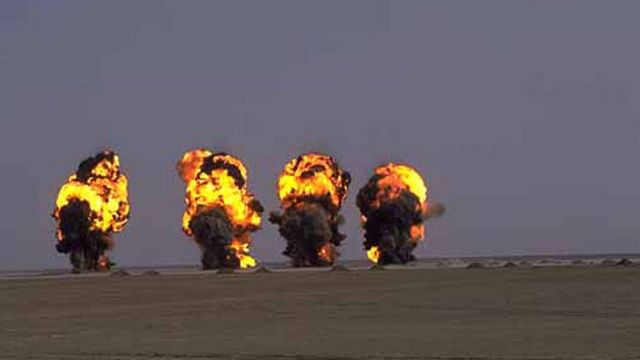The BBC News Russian Service app is available for IOS and Android . You can also subscribe to our Telegram channel.

image copyrightGetty Images
According to the United Nations Special Commission, this image shows the destruction of rockets filled with the nerve agent sarin in 1991 in Iraq
American scientists claim to have discovered the causes of a mysterious disease known as Gulf War Syndrome.
Thousands of soldiers who participated in the 1991 Gulf War suffered from it.
The disease is caused by the nerve agent sarin, released into the air as a result of the bombing of Iraqi chemical weapons caches, scientists believe.
Many Gulf War veterans have subsequently complained of a range of symptoms that developed after returning from Iraq.
But for decades, the causes of the Gulf War Syndrome could not be identified.
Sarin is usually lethal, but lead researcher Dr. Robert Haley of the University of Texas Southwestern Medical Center believes that in Iraq, the concentration of sarin in the air was low, and therefore the military inhaled it survived.
“However, it was enough for people to get sick if they were genetically predisposed to the disease,” he said.
Key to the development of the disease is a gene known as PON1, which plays an important role in breaking down toxic chemicals in the body, Haley said.
Scientists have found that people with a less effective version of the PON1 gene get sick more often.
More than a thousand randomly selected US Gulf War veterans took part in the latest study, largely funded by the US government.
“We measured exposure to nerve gas by asking veterans if they had heard chemical alarms – they were trained to recognize it. We took blood and DNA samples from all the participants, ran genetic tests and found a gene that really explains the disease. This is the so-called paraoxonase-1 (PON1), which normally protects people from nerve gas – it breaks down the nerve gas in the blood before it reaches the brain,” explains Dr. Haley.
“The problem is that there is a strong form and a weak form of the gene, and those soldiers who heard the nerve gas alarms and were exposed to small doses of nerve gas who had the strong form of the gene did not get sick,” he continues. “At the same time, people with the weak form of the gene who heard chemical alarms developed Gulf War Syndrome.”
image copyrightUT Southwestern
Dr. Haley considers the study the most complete to date and believes it will lead to the development of treatments and alleviation of the symptoms of the disease.
The Royal British Legion estimates that up to 33,000 British troops (out of more than 50,000 who fought in the Gulf War) still suffer from symptoms such as chronic fatigue, joint pain, memory and speech problems.
Before the war, Kerry Fuller from Dudley (he was 26 years old) went to the gym several times a week and was fond of rock climbing. Now even getting out of bed for him is not an easy task.
At 40, he had a stroke. He is now 58 and complains of excruciating pain in his muscles and joints. When he tosses and turns at night, he screams so loudly that he fishes the whole family. He has problems with balance, memory and speech.
“Even when I was still in the army, I already had numerous illnesses, breathing problems, chronic fatigue,” he says. “And when I started asking questions if this could have something to do with my service in the Persian Gulf, the military authorities replied: “You are talking nonsense, there is no evidence. Two paracetamols.
image copyrightFuller family
Kerry Fuller during the Gulf War
The Gulf National Association of Veterans and Families, a charity that works with sick former British soldiers, welcomed the study.
“For 30 years they have been ignored and lied to, they have not received answers to questions about exposure to toxic substances and gases and how it affects them both physically and mentally,” the association said in a statement. “We hope that The UK government will take note of this report and respond by offering Gulf veterans the opportunity to get tested, which we hope will lead to more serious and proper treatment, which they have been denied for far too long.”
The Department of Defense said, “We continue to monitor and welcome any new research that is published around the world. Veterans with service-related illness are provided with financial support through the Department of Defense military pensions and the Armed Forces occupational pension schemes.”
But the Royal British Legion said that the number of significant studies of the Gulf War Syndrome carried out in the UK is still small.
To keep getting BBC news, subscribe to our channels:
Download our application:





